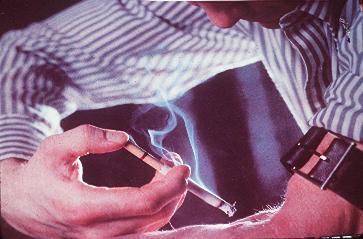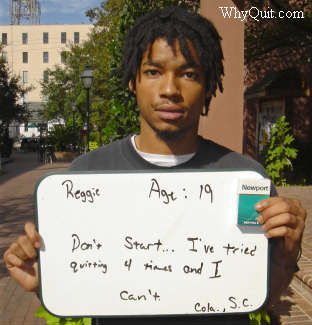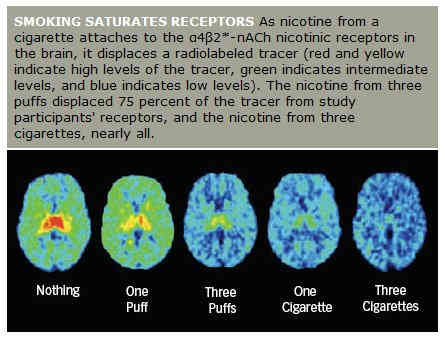
"Administration of a drug to an addict will cause re-establishment of chemical dependence upon the addictive substance."
Year after year, at least 70% of surveyed smokers say they want to stop[1] and roughly 40% make an attempt of at least one day.[2] Among e-cig users, 62.4% "want to quit e-cigarettes for good" with "more than 25% of adult e-cigarette users [reporting] an attempt to quit e-cigarettes in the past year."[3]

Thus, there is no lack of desire or effort. What's lacking is know-how. Key to breaking and staying free is understanding the "Law of Addiction."[4]
Whether users know it by name or simply understand the basic premise, failure to self-discover or to be taught this law is a horrible reason to remain hooked until the day you die. The "Law of Addiction" is not man-made law. It's as fundamental as the law of gravity and refusal to abide by it will eventually result in serious injury or worse.
The Law is rather simple. It states, "Administration of a drug to an addict will cause re-establishment of chemical dependence upon the addictive substance."
Mastering it requires acceptance of three fundamental principles:
1. That dependency upon using nicotine is a true chemical addiction, captivating the same brain dopamine wanting relief pathways as alcoholism, cocaine or heroin addiction;
2. That once established we cannot cure or kill an addiction but only arrest it; and
3. That once arrested, regardless of how long we have remained nicotine-free, that just one hit of nicotine creates an extremely high probability of full relapse.
We need not guess about what happens inside a brain that attempts to "cheat" and use nicotine during recovery. The evidence seen on brain PET scans is undeniable. Just one puff of nicotine and up to 50 percent of the brain's nicotinic-type acetylcholine receptors become occupied by nicotine.[5]

During relapse, while the smoker's conscious mind may find itself struggling with tobacco toxin tissue burning sensations and carbon monoxide induced dizziness, well-engineered dopamine pay-attention pathways are recording the event and will make the resulting dopamine "aaah" wanting relief sensation nearly impossible, in the short-term, to forget.
In fact, most walk away from their relapse experience thinking that they've gotten away with cheating and using just once. But it won't be long before their awakened dependency is again wanting, plotting to obtain, or even begging for more.
Recovery isn't about battling an entire pack, pouch, tin, box, or bottle. It's about that first bolus of nicotine striking the brain, a hit that will end our journey, cost us liberty, and land us back behind bars.
Unfortunately, conventional recovery wisdom invites relapse with statements such as "Don't let a little slip put you back to smoking."
As Joel says, it's like telling the alcoholic, "Don't let a sip put you back to drinking" or the heroin addict, "Don't let shooting-up put you back to using."[6]
Experts are fond of stating that "on average, it takes between 3-5 serious recovery attempts before breaking free of tobacco dependence," and that "every time you make an effort you're smarter and you can use that information to increase the likelihood that your subsequent attempt is successful."
What these so-called experts fail to share is the precise lesson eventually learned. Why? And why can't that lesson be taught and mastered before a user's first attempt ever?
They don't teach it because most don't understand it themselves. Instead they excuse failure before it occurs, as if trying to protect the particular smoking cessation product they are pushing from being blamed for defeat.
The lesson eventually gleaned from the school of hard-recovery-knocks is that "if I take so much as one puff, dip, vape or chew I will relapse." Just one, just once and defeat is all but assured.
"The idea that you can't stop the first time is absolutely wrong," says Joel. "The only reason it takes most people multiple attempts is that they don't understand their addiction to nicotine. How could they, no one really teaches it."
"People have to learn by screwing up one attempt after another until it finally dawns on them that each time they lost it, it happened by taking a puff. If you understand this concept from the get-go, you don't have to go through chronic [stopping and starting]."[7]
References:
2. U.S. Centers for Disease Control, Cigarette Smoking Among Adults - United States, 2007, Weekly MMWR, November 14, 2008, Volume 57(45), Pages 1221-1226.
3. Rosen RL, Steinberg ML. Interest in Quitting E-cigarettes Among Adults in the United States. Nicotine Tob Res. 2020;22(5):857-858. doi:10.1093/ntr/ntz062
4. Spitzer J, The Law of Addiction, 1988, https://whyquit.com/joel/Joel_04_02_law_of_addiction.html
5. Brody AL et al, Cigarette smoking saturates brain alpha 4 beta 2 nicotinic acetylcholine receptors, Archives of General Psychiatry, August 2006, Volume 63(8), Pages 907-915.
6. Spitzer J, Can we motivate a smoker to quit if he thinks he doesn't want to quit? 2000 https://whyquit.com/joel/Joel_03_28_motivating_cessation.html - accessed August 11, 2020.
7. Spitzer J, Is this your first time quitting? 12/29/01, https://whyquit.com/joels-videos/if-this-is-your-first-time-quitting/.
All rights reserved
Published in the USA
